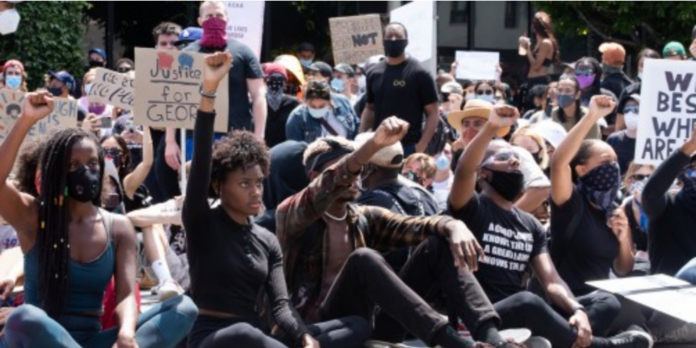Black Americans experience an increase in poor mental health days during weeks when two or more incidents of anti-Black violence occur and when national interest surrounding the events is higher, according to a new study involving a researcher at Washington University in St. Louis.
Previous research has shown that experiencing racism, even vicariously, can harm the mental and physical health of others of the same racial group. The new study — published April 19 in the journal Proceedings of the National Academy of Sciences (PNAS) — is the first to examine how police killings and other violent, racial incidents with large media coverage impact Black Americans’ mental health on a national scale.
The study is particularly timely as the public attention has been turned to the murder trial of Derek Chauvin and suggests that the verdict in the case is likely to reverberate far beyond Minneapolis.
“This study provides additional evidence of the toxic nature of systemic racism and the role racism plays in producing, maintaining and amplifying health disparities. If we want to improve the health of our population, we must dismantle racism,” said co-author Hedwig Lee, professor of sociology in Arts & Sciences and co-director of the Center for the Study of Race, Ethnicity & Equity at Washington University in St. Louis.
With support from the National Institute on Minority Health and Health Disparities of the National Institutes of Health, the researchers identified 49 incidents of highly publicized anti-Black violence between 2013-17 using news coverage of the first 60 days after the incident. These violent acts included police killings of Blacks and hate-crime murders as well as decisions to not indict/convict officers. They established the number of the incidents happening per week and quantified weekly national interest using Google Trends.
To evaluate if psychological distress was influenced by the timing of these incidents, the authors used two sources: Google search terms related to suicide, anxiety and depression, along with the average poor mental health days among Black respondents from the 2012-17 Behavioral Risk Factor Surveillance System (BRFSS) survey. The BRFSS completes more than 400,000 telephone interviews of adult residents per year, making it the largest continuous health survey system in the world.
“If we want to improve the health of our population, we must dismantle racism.”
The study included data from 217,171 Black and 2,092,683 white Americans and their responses to the question: Now, thinking about your mental health, which includes stress, depression and problems with emotions, for how many days during the past 30 days was your mental health not good?
The study found that racial violence was not consistently associated with national distress. However, Black respondents of the BRFSS reported more poor mental health days during weeks when two or more incidents of anti-Black violence occurred and when national interest surrounding the events was higher. In comparison, white respondents’ mental health was not significantly correlated with the timing of racial violence.
Additionally, legal decisions where officers involved in racial violence were not indicted were most strongly associated with poor mental health days for Blacks. The study authors speculated that the unique importance of legal proceedings to influence Black Americans’ mental health may be due to the role of perceived injustice, particularly given the long history of state-sanctioned anti-Black violence in the United States.
The authors conclude that reducing anti-Black violence would benefit the mental health of Blacks across the nation.
“There’s strong evidence that in addition to being a social and moral crisis, racism is an important public health issue that increases risk of a range of diseases and mental health problems,” said co-author David Chae, associate professor, director of the Society, Health and Racial Equity (SHARE) Lab, and associate dean for research at Tulane University. “The experiences of others in a racial group are shared and can be personal sources of stress, as well.”
When these incidents of anti-Black violence receive widespread media exposure, the collective trauma is felt across the nation.
“As we saw from the protests following the killing of George Floyd, the grief, outrage and injustice that people experience doesn’t just relate to your immediate community,” said David Curtis, an assistant professor of family and consumer studies at the University of Utah. “If we’re thinking about what’s the population health impact, our findings show the mental toll is not just confined to the community where the incident took place.”
*Contributing authors include Ken Smith and Jaewhan Kim of the University of Utah, Connor Martz of Auburn University, and Michael Kramer of Emory University.
Story & Photo Credit: Newswise/Washington University in St. Louis



































